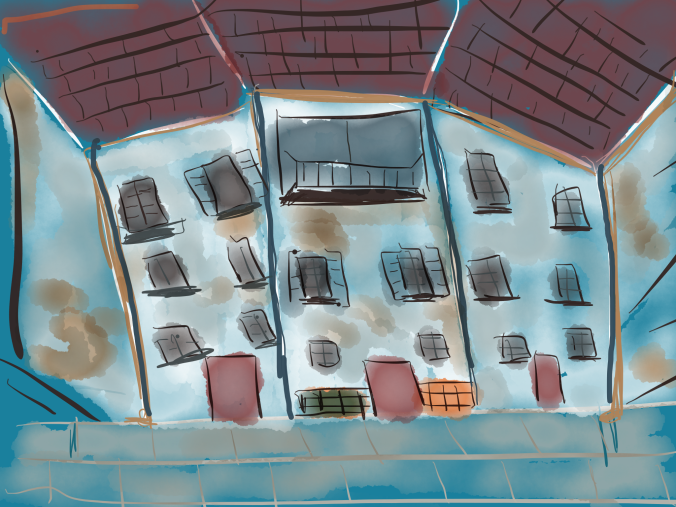
“Broken Umbrella” illustration 2016 by jpbohannon
Dag Solstad, a novelist and playwright, has won numerous prizes for his writing, including the prestigious Nordic Prize for Literature. He is the only author to have recived the Norwegian Literary Critics Award three times. This is the first English translation of his work. Solstad lives in both Oslo and Berlin.
Back Cover copy of Shyness and Dignity by Dag Solstad
And most of us have never heard of him.
In general, we Americans are very ignorant of writers in other languages. It is not our fault (despite our staunch embrace of our mono-lingualism). American publishing houses take very few chances with translated works. Of course, there are exceptions. Publishing houses such as Europa Editions, Graywolf Press, and Vintage have been steadfast in bringing forth translated novels. And every so often they catch on. Elena Ferrante is a phenomenon; Jo Nesbo continues to thrill; and the Girl with the Dragon Tattoo series was a publishing behemoth. But in general, we are isolationists when it comes to reading.
To wit, Shyness and Dignity, Solstad’s first novel to be translated into English, was published in Norway in 1996 and in the States in 2006. It was his first novel translated into English–thirty-seven years after his first book came out in 1969.
(One would think that his books covering each of the FIFA World Cups from 1982 on would have introduced him to Americans. But then again, we as a nation are just beginning to watch soccer; obsessive reading about it is probably a bit down the road.)
And so we have Shyness and Dignity. (As of now, there are three novels translated: Shyness and Dignity, Professor Andersen’s Night, and Novel 11, Book 18.)
Elias Rukla is a middle-aged teacher, teaching Norwegian Literature in a National high-school in Oslo. He is frustrated by his work, has lost belief in the relevance of what he professes, and feels useless in the new educational arena. One day, after his last class, a class in which he felt he was being particularly trenchant, in which for the first time in a while he believed he had said something original, something worthwhile, and in which at his greatest moment of insight, he was interrupted by the bored groan of one of his students, Elias left the building for the day.
It was raining, he was prepared, but his umbrella would not open. Another moment of frustration. Many attempts at opening it escalated into a battle. He sliced his hands with the umbrella ribs, threw the umbrella on the ground and began jumping on it. As students gathered around to watch their teacher wrestle with this inanimate object, he lashed out, calling one tall blond student a “fat snout” and a “damned bitch.”
At that moment, he realized his career was over.
This scene is actually a very small part of the novel. The opening frame, if you will. As he wanders the streets of Oslo, considering the irreparable consequences of his actions, he thinks of how he would tell his wife.
And then he thinks of how he had met her. And then he thinks of the friend who had introduced them. And then he thinks of what he and she and the friend had once been and had now become.
It is a story of hopes unrealized, optimism and activism dampened, and life soullessly borne.
We follow Elias through his graduate school days and his fascination with a young philosophy student who is the darling of both his peers and his professors. Not only is Johan Corneliussen a prodigy in philosophy–particularly Kantian philosophy–but he is a prodigy in life. As Elias explains:
Johan Corneliussen moved without difficulty from ice hockey to Kant, from interest in advertising posters to the Frankfurt school of philosophy, from rock ‘n’ roll to classical music. Operettas and Arne Nordheim … Music, ice hockey, literature, film, soccer, advertising, politics, skating.
It was this total immersion into life–so different from the shy and insecure Elias Rukla–that was Corneliussen’s attraction. And Rukla became his shadow, inseparable friend, partaking in it all and basking in the reflected adulation that was directed towards his companion.
As we follow the college students through their various interests and politics, their associates and lovers, we also see the crumbling of young certainties. Except that Elias retains his much further into life.
It is struggle with his umbrella that brought about this realization that all has changed, his career, his wife, his beliefs, his interests.
And with this meandering journey homeward, he has reviewed his entire life up to this very moment, this moment when he feared what he would say to his wife. All had changed and he was just realizing it now.
Solstad’s novel is an examination into what makes us act, what compromises we make, and what indignities we are willing to bear. It is an internal examination, not of conscience, but of consciousness. It is a somewhat dreary look at the dampening of hope, the degrading of cultural literacy, the momentum of capitalism. Solstad’s sentences are long and meandering, walking through a paragraph much the way the Elias walks through the streets of Oslo, but each one is perfect.
Each one brings us a few steps closer to the destination that Elias must ultimately reach.





